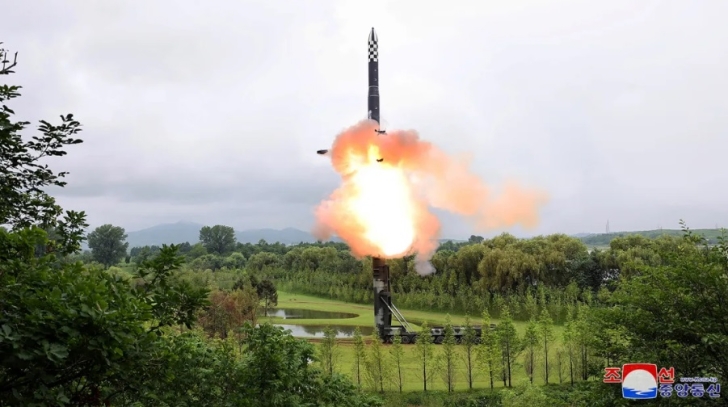
North Korea says it will no longer seek reunification with South Korea, will launch new spy satellites in 2024
North Korea will no longer seek reconciliation and reunification with South Korea, Kim Jong Un has declared, as his nation vowed to put three new military spy satellites into orbit in 2024.
Advertisement
Kim said inter-Korean relations had become “a relationship between two hostile countries and two belligerents at war,” the state-run news agency KCNA reported.
“It’s time for us to acknowledge the reality and clarify our relationship with the South,” Kim said, adding that if Washington and Seoul were to attempt a military confrontation with Pyongyang, its “nuclear war deterrent will not hesitate to take serious action.”
“I believe that it is a mistake that we must no longer make to deal with the people who declare us as ‘the main enemy’ and seek only opportunities for ‘[our] regime collapse’ and ‘unification by absorption’ by collaborating for reconciliation and unification,” Kim added.
North and South Korea have been cut off from each other since the end of the Korean War in 1953 which ended with an armistice. The two sides are still technically at war, but both governments have long sought the goal of one day reunifying.
Relations have ebbed and flowed over the decades, but tensions have remained particularly high in more recent years after Kim Jong Un ramped up the country’s nuclear weapons program in defiance of international sanctions.
Last week, KCNA reported that Kim had instructed the country’s army, munitions industry, nuclear weapons and civil defense sectors to accelerate war preparations in response to “confrontation moves” by the US.
At the time, KCNA described the political and military situation on the Korean Peninsula as “grave,” saying it had reached an “extreme” point because of Washington.
Kim’s latest comments on reunification were significant, according to Hoo Chiew-Ping, a senior fellow at the East Asian International Relations CAUCUS (EAIR) and member of the Asia Pacific Nuclear Advisory Panel (APNAP), who said the North Korean leader has been increasingly walking away from “inter-Korean relations” in recent years.
“This will mark a critical milestone on the Korean Peninsula where extending the olive branch by future South Korean administrations will be vehemently rejected by North Korea,” Hoo told CNN.
Pyongyang was keener to further relations instead with current allies like “China and Russia, and a selected network of countries around the world which will continue to enable its proliferation and financial outreach,” she added.
“The US, South Korea and Japan are excluded from Kim’s strategic outreach for now.”
Ja Ian Chong, an associate professor of political science and nonresident scholar at Carnegie China, said Kim’s speech “reflects the reality that unification is not a short or even medium-term possibility (for the Koreas).”
“Given this situation, the question is whether non-unification means continuation of the status quo or if North Korea believes it needs to act to protect itself more actively, or even preempt what it sees as possible aggression from South Korea,” Chong added.
“The former is tolerable even as North Korea seeks to increase its defensive capability, since it keeps the status quo and is better than some belief in armed unification. If the latter, then friction and even tensions with South Korea and northeast Asia will likely rise,” he warned.
Spy satellites
After repeated failures, North Korea in November said it had put its first spy satellite into orbit.
Analysts said if the spacecraft works, it could provide significantly improve North Korea’s military capabilities, including enabling it to more accurately target opponents’ forces.
Kim hailed the feat, celebrating with workers at the launch site according to images put out by state media. South Korea called the launch a “clear violation” of a UN Security Council resolution that prohibits North Korea from using ballistic missile technology.
On Sunday KCNA said North Korea plans to bolster that program with three additional spy satellites in the new year.
Ja Ian Chong, an associate professor of political science and nonresident scholar at Carnegie China, said Kim’s speech “reflects the reality that unification is not a short or even medium-term possibility (for the Koreas).”
“Given this situation, the question is whether non-unification means continuation of the status quo or if North Korea believes it needs to act to protect itself more actively, or even preempt what it sees as possible aggression from South Korea,” Chong added.
“The former is tolerable even as North Korea seeks to increase its defensive capability, since it keeps the status quo and is better than some belief in armed unification. If the latter, then friction and even tensions with South Korea and northeast Asia will likely rise,” he warned.
Spy satellites
After repeated failures, North Korea in November said it had put its first spy satellite into orbit.
Analysts said if the spacecraft works, it could provide significantly improve North Korea’s military capabilities, including enabling it to more accurately target opponents’ forces.
Kim hailed the feat, celebrating with workers at the launch site according to images put out by state media. South Korea called the launch a “clear violation” of a UN Security Council resolution that prohibits North Korea from using ballistic missile technology.
On Sunday KCNA said North Korea plans to bolster that program with three additional spy satellites in the new year.
credit: CNN




